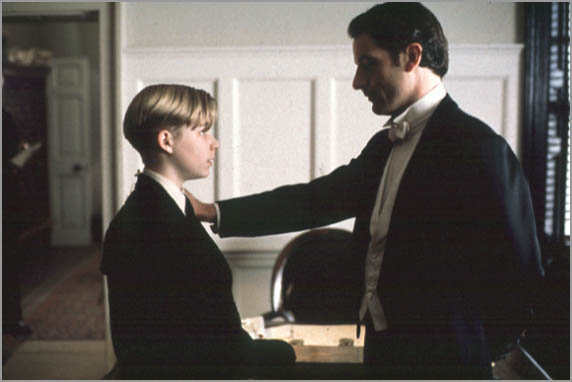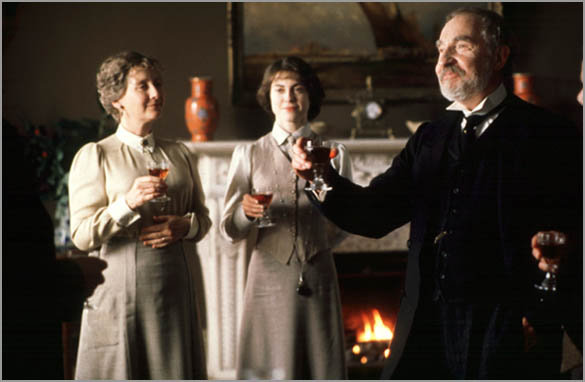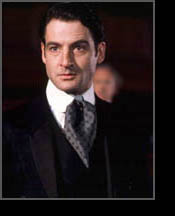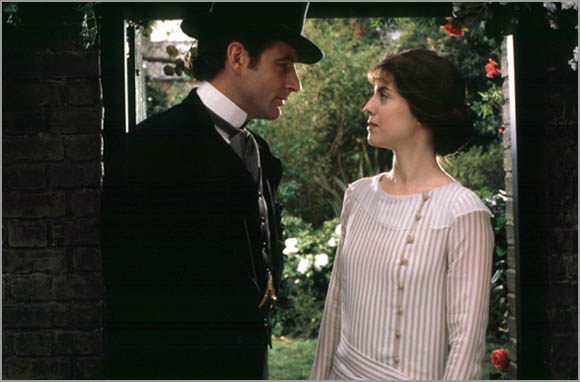![[safe]](safe.gif)

The Winslow Boy

Starring Nigel Hawthorne, Jeremy Northam, Rebecca Pidgeon, Gemma Jones, Guy Edwards
Directed by David Mamet
![[safe]](safe.gif)


A friend of mine, when told that "The Winslow Boy" had received a "G" rating from the MPAA was shocked - nay, flabbergasted. He aserted, "David Mamet CANNOT make a "G" rated movie!!" And, indeed, based on the playwright-turned-film auteur's previous works, this film would seem like an anomaly. Based on a 1946 play by Terence Rattigan, "The Winslow Boy" features none of the swearing, staccato speech rhythms, hard men, duplicitous/useless women that Mamet is known for. And did I mention that it's set in turn of the century England, complete with frocks and wigs and very proper manners?

It is to Mamet's credit that all of these initial reservations are laid to rest almost immediately when the film opens. Using an understated score and simple, clear credits, Mamet introduces his audience into a world where gloved hands and genteel words wound far more harshly than outright violence and cursing. Just as "The Age of Innocence" remains Martin Scorsese's most brutal and violent film, Mamet's "The Winslow Boy" is a visceral, mysterious gem that only reveals all of its many layers toward the end.
The story is simplicity itself. Arthur Winslow, a well-to-do banker (Nigel Hawthorne) and his wife Grace (Gemma Jones) are about to celebrate the engagement of their independent-minded daughter Katherine (Rebecca Pidgeon) when an unexpected visitor arrives and sets into  motion a chain of events that culminate in a nation-wide cause celebre. The Winslow's youngest son Ronnie (Guy Edwards) has been expelled from his naval academy for allegedly stealing and cashing a postal order of inconsequential value. The boy protests his innocence and his enraged father, supported in his decision by his strong-willed daughter, decides to take the matter to the law. Thwarted in their initial attempts to "let right be done", they eventually land the services of Sir Robert Morton (Jeremy Northam), a flamboyant, high-profile lawyer given to courtroom theatrics and known for dismantling a trade union - a fact which puts him in the bad books of Katherine, who thinks poorly of his character and wastes no time in telling him so. After grilling the boy on the facts - during which time the innocence of the boy is seriously called into question - Morton unexpectedly takes the case, and the film traces the dwindling fortunes of the Winslows as the case escalates into a national debate, while Morton's tempestuous sparring with Katherine leads the pair into a tense, uncomfortable and sometimes scintillating relationship.
motion a chain of events that culminate in a nation-wide cause celebre. The Winslow's youngest son Ronnie (Guy Edwards) has been expelled from his naval academy for allegedly stealing and cashing a postal order of inconsequential value. The boy protests his innocence and his enraged father, supported in his decision by his strong-willed daughter, decides to take the matter to the law. Thwarted in their initial attempts to "let right be done", they eventually land the services of Sir Robert Morton (Jeremy Northam), a flamboyant, high-profile lawyer given to courtroom theatrics and known for dismantling a trade union - a fact which puts him in the bad books of Katherine, who thinks poorly of his character and wastes no time in telling him so. After grilling the boy on the facts - during which time the innocence of the boy is seriously called into question - Morton unexpectedly takes the case, and the film traces the dwindling fortunes of the Winslows as the case escalates into a national debate, while Morton's tempestuous sparring with Katherine leads the pair into a tense, uncomfortable and sometimes scintillating relationship.
Paring down Rattigan's play and inventively opening up the stage-bound premise from drawing rooms to include scenes set in the garden and thereabouts, Mamet's film not only displays technical proficiency with the source material, but his adaptation has streamlined the various arcs of the story while simultaneously muddying several key aspects of it to lend the material psychological depth and a contemporary sense of ethical and moral tension. What exactly drives Arthur to such extreme lengths to defend the name of his 13 year old son - is it pride or a true hunger for justice? Does Katherine hold on to convictions out of the convenience her station in life affords her, or is she motivated by genuine passion for her causes? Why exactly does Morton take the case since he never seems concerned about its outcome - is it a quest for personal publicity at the cost of his client, or could there be more altruistic reasons at work? These may seem like minor, unimportant questions, but Mamet hides and weaves them so well into his narrative framework that their uncovering and resolutions seem like major discoveries, and lend his film a level of complexity that audiences will find intriguing and delightful.

Mamet's way with actors is assured, as evinced by the uniformly stellar performances in the film. Nigel Hawthorne again brings dignity and depth to a role that could have easily been one-note and pathetic. The young Guy Edwards plays his character with a skilful mix of duplicity and innocence that makes Ronnie the enigmatic center of attention. And Gemma Jones has one meaty scene to display her considerable talents as a woman whose life is undone by her husband's determination to set things right. Many audiences may find Rebecca Pidgeon's excessively arch style of acting distracting - I personally found her annoying in "The Spanish Prisoner", where her line readings seemed off-kilter and strange - but in this case, it serves the material rather well. Her Katherine seems like a fully fleshed character full of contradictions and this is largely due to the strident way she says her lines in every scene. Of especial delight are her verbal sparrings with Jeremy Northam's Sir Robert Morton - on paper, the relationship is all barbs and quips, but the actors play their scenes with a droll sense of humor that is entertaining and exciting to watch. Northam's role is perhaps the hardest to essay, since Morton's motivations and actions largely go hidden from the audience, and his work here recalls his splendid turn as the dashing Mr. Knightley in "Emma" - at once charming and steely, wish a dash of wit and playfulness mixed in.
"The Winslow Boy" may lack the darkness and tortures of the usual Mamet material, but it offers a lot more than what meets the eye initially. I found myself constantly thinking about the film days later, turning over plot points and marvelling again at the intricate, delicate storyline, and the sturdy, robust entertainment it yielded. Highly recommended.